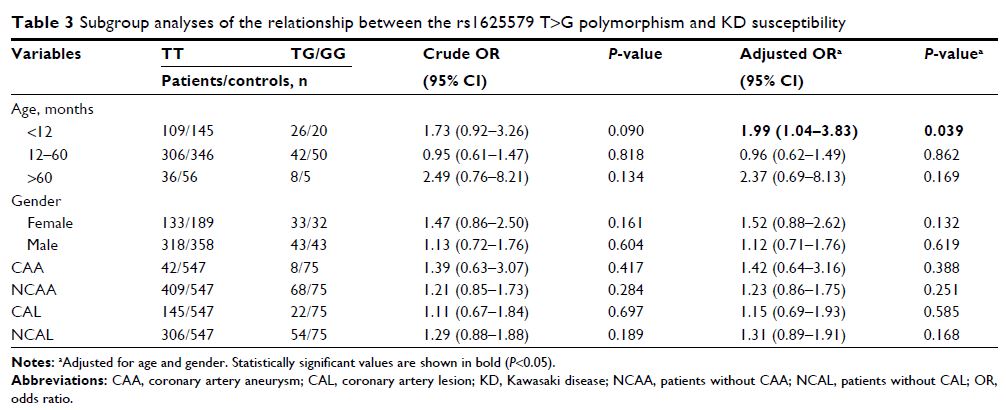108605
论文已发表
注册即可获取德孚的最新动态
IF 收录期刊
- 3.4 Breast Cancer (Dove Med Press)
- 3.2 Clin Epidemiol
- 2.6 Cancer Manag Res
- 2.9 Infect Drug Resist
- 3.7 Clin Interv Aging
- 5.1 Drug Des Dev Ther
- 3.1 Int J Chronic Obstr
- 6.6 Int J Nanomed
- 2.6 Int J Women's Health
- 2.9 Neuropsych Dis Treat
- 2.8 OncoTargets Ther
- 2.0 Patient Prefer Adher
- 2.2 Ther Clin Risk Manag
- 2.5 J Pain Res
- 3.0 Diabet Metab Synd Ob
- 3.2 Psychol Res Behav Ma
- 3.4 Nat Sci Sleep
- 1.8 Pharmgenomics Pers Med
- 2.0 Risk Manag Healthc Policy
- 4.1 J Inflamm Res
- 2.0 Int J Gen Med
- 3.4 J Hepatocell Carcinoma
- 3.0 J Asthma Allergy
- 2.2 Clin Cosmet Investig Dermatol
- 2.4 J Multidiscip Healthc

miRNA-137 基因中的 rs1625579 T>G 多态性使中国南方人群面临早发性川崎病的风险
Authors Che D, Li J, Fu L, Pi L, Rong X, Wang Y, Xu Y, Huang P, Chu M, Gu X
Received 14 May 2018
Accepted for publication 13 June 2018
Published 3 August 2018 Volume 2018:11 Pages 1055—1060
DOI https://doi.org/10.2147/IDR.S174140
Checked for plagiarism Yes
Review by Single-blind
Peer reviewers approved by Dr Andrew Yee
Peer reviewer comments 2
Editor who approved publication: Professor Suresh Antony
Background: Kawasaki disease (KD) mainly manifests as excessive inflammation
and vascular endothelial cell injury. This disease generally occurs in children
younger than 5 years of age and is more severe in children younger than 12
months. KD affects males and females at a ratio of 1.5:1. Polymorphisms of the
rs1625579 locus in the miR-137 gene
are associated with schizophrenia susceptibility, and high glucose-induced
upregulation of miR-137 in
vascular endothelial cells promotes monocyte chemotaxis and inflammatory
cytokine secretion in gestational diabetes mellitus. However, researchers have
not reported whether rs1625579 is associated with KD susceptibility or onset.
Therefore, we investigated the relationship between the miRNA-137 rs1625579 T>G
polymorphism and KD susceptibility.
Methods: TaqMan real-time polymerase chain reaction was applied to
determine the genotypes of 532 patients with KD (365 males and 167 females) and
623 control subjects (402 males and 221 females).
Results: Comparison of all cases with all controls revealed that the
rs1625579 T>G polymorphism was not associated with KD susceptibility.
However, a subgroup analysis revealed that subjects with the rs1625579 TG/GG
genotypes exhibited a significantly higher onset risk for KD before 12 months
of age than carriers of the TT genotype (adjusted age and gender odds
ratio=1.99, 95% CI=1.04–3.83; P =0.039).
Conclusion: Our results indicate that the rs1625579 T>G polymorphism confers
a risk of early-onset KD in southern Chinese children.
Keywords: Kawasaki disease, miRNA-137, rs1625579, susceptibility, early
onset
